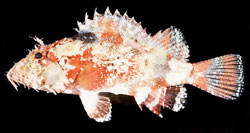
Columbia researchers develop “fingerprinting” techniques for SAR mapping
Research by scientists at the Lamont-Doherty Earth Observatory at Columbia University shows that Synthetic Aperture Radar (SAR) polarimetry is a more superior technology for rapidly identifying disaster zones than the currently used optical remote sensing technologies, such as Landsat and SPOT. Their findings are published in the Journal of Geophysical Research, and coincide with an opportunity to outfit satelli

An estimated 5,000 previously unknown ocean fish species and hundreds of thousands of other marine life forms are yet to be discovered, according to scientists engaged in a massive global scientific collaboration to identify and catalog life in the oceans.
The new marine fish species, being identified at an average rate of 160 per year (roughly three new species per week since year 2000), are being catalogued and mapped by the Census of Marine Life (CoML), an unprecedented cooperativ
Currents connecting Pacific and Indian Oceans are colder and deeper than thought
Scientists at Columbia University’s Lamont-Doherty Earth Observatory have found that currents connecting the Indian and Pacific Oceans are colder and deeper than originally believed. This discovery may one day help climate modelers predict the intensity of the Asian monsoon or El Nino with greater accuracy and with more lead-time than is currently possible.
The findings by Arnold Gordon, R. Dwi
New evidence of global warming in Earth’s past supports current models for how climate responds to greenhouse gases
CA–Scientists have filled in a key piece of the global climate picture for a period 55 million years ago that is considered one of the most abrupt and extreme episodes of global warming in Earth’s history. The new results from an analysis of sediment cores from the ocean floor are consistent with theoretical predictions of how Earth’s climate would respon
Recently observed change in Arctic temperatures and sea ice cover may be a harbinger of global climate changes to come, according to a recent NASA study. Satellite data — the unique view from space — are allowing researchers to more clearly see Arctic changes and develop an improved understanding of the possible effect on climate worldwide.
The Arctic warming study, appearing in the November 1 issue of the American Meteorological Society’s Journal of Climate, shows that compared to the 19
Florida Tech professor quadruples amount of information carried on single cable
Dr. Syed Murshid’s eyes light up as he flips the switches, one, two, three, and four. As the Florida Tech associate professor of electrical engineering uses his optics projector, pulses of red light project onto a wall. With each click, a new concentric circle appears. The circles represent a sea change in information technology. When he’s finished, a red glowing bull’s eye shines brightly,